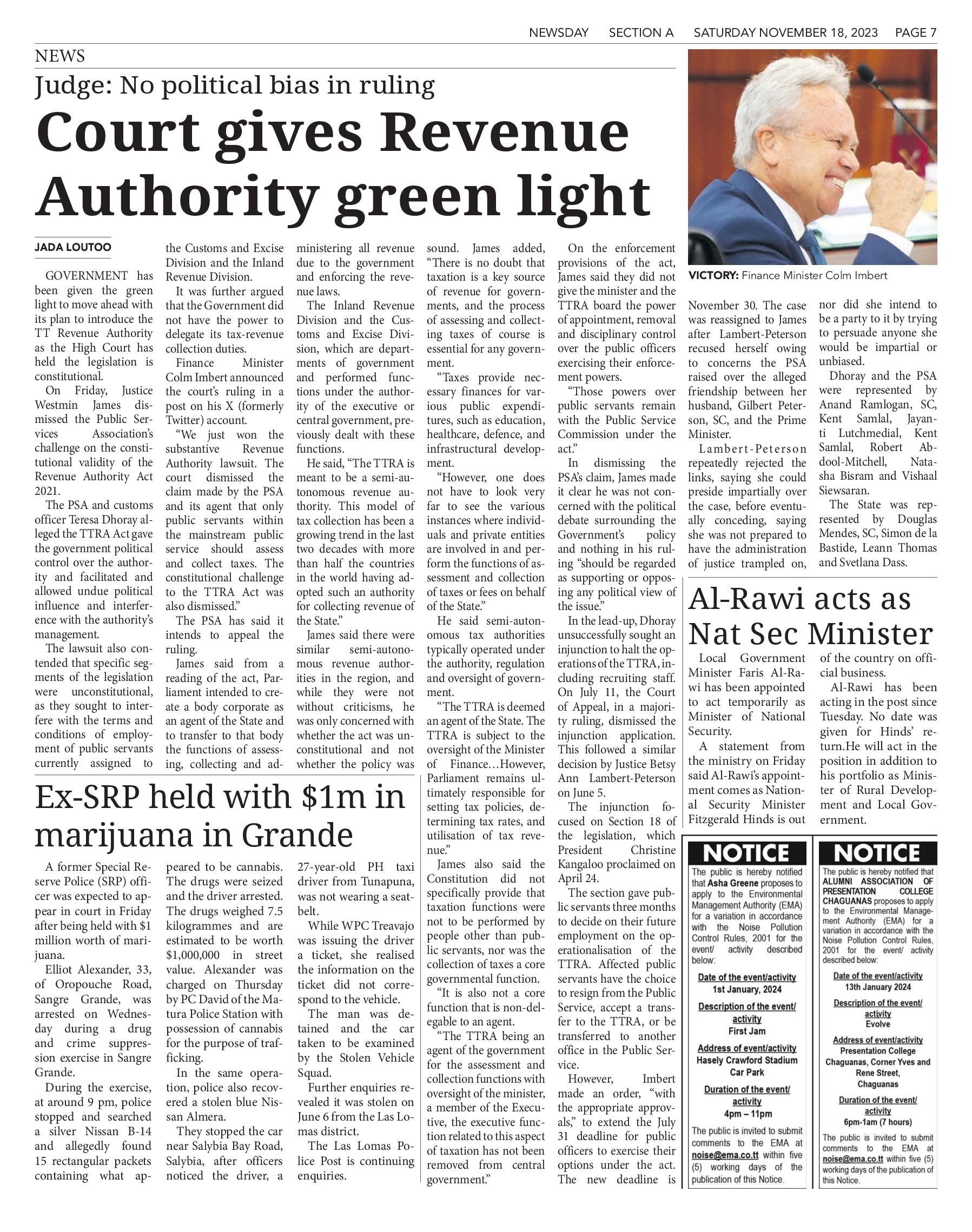Judge: No political bias in ruling VICTORY: Finance Minister CoIm Imbert JADA LOUTOO GOVERNMENT has been given the green light to move ahead with its plan to introduce the TT Revenue Authority as the High Court has held the legislation is constitutional. On Friday, Justice Westmin James dismissed the Public Services Association’s challenge on the constitutional validity of the Revenue Authority Act 2021. The PSA and customs officer Teresa Dhoray alleged the TTRA Act gave the government political control over the authority and facilitated and allowed undue political influence and interference with the authority’s management The lawsuit also contended that specific segments of the legislation were unconstitutional, as they sought to interfere with the terms and conditions of employment of public servants currently assigned to the Customs and Excise Division and the Inland Revenue Division. It was further argued that the Government did not have the power to delegate its taxrevenue collection duties. Finance Minister Colm Imbert announced the court’s ruling in a post on his X (formerly Twitter) account “We just won the substantive Revenue Authority lawsuit.
The court dismissed the daim made by the PSA and its agent that only public servants within the mainstream public service should assess and collect taxes. The constitutional challenge to the TTRA Act was also dismissed.” The PSA has said it intends to appeal the ruling. James said from a reading of the act, Parliament intended to create a body corporate as an agent of the State and to transfer to that body the functions of assessin . , collectin: and administering all revenue due to the government and enforcing the revenue laws. The Inland Revenue Division and the Customs and Excise Division, which are departments of government and performed functions under the authority of the executive or central government, previously dealt with these functions. He said, “The TTRA is meant to be a semiautonomous revenue authority.
This model of tax collection has been a growing trend in the last two decades with more than half the countries in the world having adopted such an authority for collecting revenue of the State James said there were similar semiautonomous revenue authorities in the region, and while they were not without criticisms, he was only concerned with whether the act was unconstitutional and not whether the • olic was sound. James added, “There is no doubt that taxation is a key source of revenue for governments, and the process of assessing and collecting taxes of course is essential for any government. “Taxes provide necessary finances for various public expenditures, such as education, healthcare, defence, and infrastructural development. “However, one does not have to look very far to see the various instances where individuals and private entities are involved in and perform the functions of assessment and collection of taxes or fees on behalf of the State?’ He said semiautonomous tax authorities typically operated under the authority, regulation and oversight of government. “The TTRA is deemed an agent of the State. The TTRA is subject to the oversight of the Minister of Finance… However, Parliament remains ultimately responsible for setting tax policies, determining tax rates, and utilisation of tax revenue?’ James also said the Constitution did not specifically provide that taxation functions were not to be performed by people other than public servants, nor was the collection of taxes a core governmental function. “It is also not a core function that is nondelegable to an agent. The TTRA being an agent of the government for the assessment and collection functions with oversight of the minister, a member of the Executive, the executive function related to this aspect of taxation has not been removed from central government” On the enforcement provisions of the act, James said they did not give the minister and the TTRA board the power of appointment, removal and disciplinary control over the public officers exercising their enforcement powers. “Those powers over public servants remain with the Public Service Commission under the act?’ In dismissing the PSA’s claim, James made it clear he was not concerned with the political debate surrounding the Government’s policy and nothing in his ruling “should be regarded as supporting or opposing any political view of the issue In the leadup, Dhoray unsuccessfully sought an injunction to halt the operations of the TTRA, induding recruiting staff On July 11, the Court of Appeal, in a majority ruling, dismissed the injunction application.
This followed a similar decision by Justice Betsy Ann LambertPeterson on June 5. The injunction focused on Section 18 of the legislation, which President Christine Kangaloo proclaimed on April 24. The section gave public servants three months to decide on their future employment on the operationalisation of the TTRA. Affected public servants have the choice to resign from the Public Service, accept a transfer to the TTRA, or be transferred to another office in the Public Service. However, Imbert made an order, “with the appropriate approvals,” to extend the July 31 deadline for public officers to exercise their options under the act.
The new deadline is November 30. The case was reassigned to James after LambertPeterson recused herself owing to concerns the PSA raised over the alleged friendship between her husband, Gilbert Peterson, SC, and the Prime Minister. LambertPeterson repeatedly rejected the links, saying she could preside impartially over the case, before eventually conceding, saying she was not prepared to have the administration of justice trampled on, nor did she intend to be a party to it by trying to persuade anyone she would be impartial or unbiased. Dhoray and the PSA were represented by Anand Ramlogan, SC, Kent Samlal, Jayanti Lutchmedial, Kent Samlal, Robert AbdoolMitchell, Natasha Bisram and Vishaal Siewsaran. The State was represented by Douglas Mendes, SC, Simon de la Bastide, Leann Thomas and Svetlana Dass.

